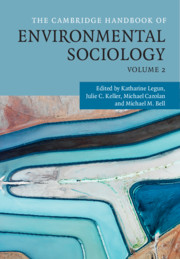Book contents
- The Cambridge Handbook of Environmental Sociology Volume 2
- The Cambridge Handbook of Environmental Sociology
- Copyright page
- Contents
- Figures
- Tables
- Contributors
- Foreword
- Introduction
- Part I Methods
- Part II Embodied Environmental Sociology
- Part III Beyond the Human
- Part IV Sustainability and Climate Change
- Part V Resources
- Part VI Food and Agriculture
- 22 Future and Food: New Technologies, Old Political Debates
- 23 Eating Our Way to a Sustainable Future?
- 24 Neoliberal Globalization and Beyond: Food, Farming, and the Environment
- 25 The Sociology of Environmental Morality: Examples from Agri-Food
- Part VII Social Movements
- Index
- References
22 - Future and Food: New Technologies, Old Political Debates
from Part VI - Food and Agriculture
Published online by Cambridge University Press: 05 November 2020
- The Cambridge Handbook of Environmental Sociology Volume 2
- The Cambridge Handbook of Environmental Sociology
- Copyright page
- Contents
- Figures
- Tables
- Contributors
- Foreword
- Introduction
- Part I Methods
- Part II Embodied Environmental Sociology
- Part III Beyond the Human
- Part IV Sustainability and Climate Change
- Part V Resources
- Part VI Food and Agriculture
- 22 Future and Food: New Technologies, Old Political Debates
- 23 Eating Our Way to a Sustainable Future?
- 24 Neoliberal Globalization and Beyond: Food, Farming, and the Environment
- 25 The Sociology of Environmental Morality: Examples from Agri-Food
- Part VII Social Movements
- Index
- References
Summary
This chapter looks at two case studies: two groups that are part of “smart” farming assemblages in quite divergent ways. These data are derived from interviews with (1) twenty employees (technicians, sale reps, and engineers) from various big data companies located from around North America and the U.K., and (2) eighteen farmers from around the USA engaged to various degrees with the loosely organized group called Farm Hack. The chapter beings by briefly introducing each empirical case. Next, findings from an instrument used to generate word clouds are explored. The word clouds are used to interrogate how the two populations thought about the concept of good citizen. The chapter concludes by discussing what it means for data and code in an agricultural context to have politics and how we might think about prioritizing some techniques, in particular, those supporting collaborative ontologies, over others.
- Type
- Chapter
- Information
- The Cambridge Handbook of Environmental Sociology , pp. 377 - 389Publisher: Cambridge University PressPrint publication year: 2020



